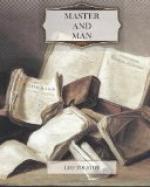|
This section contains 12,379 words (approx. 42 pages at 300 words per page) |

|
SOURCE: “Detail and Meaning in Tolstoy's Master and Man,” in Criticism, Vol. 11, Winter, 1969, pp. 31-58.
In the following essay, Hagan analyzes the religious symbolism found in Master and Man to better understand Tolstoy's artistic method.
Though Master and Man (1895) has long been generally recognized, together with The Death of Ivan Ilych, Father Sergius, and Hadji Murad, as one of the masterpieces of Tolstoy's third period of authorship, close study of its artistic methods has only begun. Turning as it does (in accord with Tolstoy's favorite device of antithesis) on an obvious contrast between two types of men and two sets of moral values, and on the straightforward conversion of one of these men from the one set to the other, no work of equal seriousness and importance might initially seem to be less arcane. But this conclusion would be a mistake. Though transparently didactic, the story is by...
|
This section contains 12,379 words (approx. 42 pages at 300 words per page) |

|


